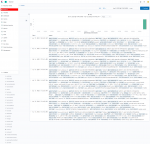
#LOGSTACK LIST FILEBEATS INSTALL#
bin: Binary scripts including logstash to start Logstash and logstash-plugin to install plugins.

home: Home directory of the Logstash installation.Logstash supports different types of outputs to store or send the final processed data like elasticsearch, cloudwatch, csv, file, mongodb, s3, sns, etc. An event can pass through multiple outputs, but once all output processing is complete, the event has finished its execution.

Outputs are the final phase of the Logstash pipeline. Logstash supports different types of filters for data processing like gork, mutate, aggregate, csv, json, etc. You can combine filters with conditionals to perform an action on an event if it meets certain criteria. Filters:įilters are intermediary processing devices in the Logstash pipeline. Logstash supports different input as your data source, it can be a plain file, syslogs, beats, cloudwatch, kinesis, s3, etc. Inputs are used to get data into Logstash. In layman term, you can compare a Logstash with an ETL tool in modern RDBMS systems. Inputs and outputs support codecs that enable you to encode or decode the data as it enters or exits the pipeline without having to use a separate filter.

Inputs generate events, filters modify them and outputs ship them elsewhere. The Logstash event processing pipeline has three stages: inputs => filters => outputs. Logstash accelerates your insights by harnessing a greater volume and variety of data. Any type of event can be enriched and transformed with a broad array of input, filter, and output plugins, with many native codecs further simplifying the ingestion process. While Logstash originally drove innovation in log collection, its capabilities extend well beyond that use case. Cleanse and democratize all your data for diverse advanced downstream analytics and visualization use cases. Logstash can dynamically unify data from disparate sources and normalize the data into destinations of your choice. Logstash is an open-source data collection engine with real-time pipelining capabilities. In this series, we will explore one of the most popular log management tools in DevOps better known as ELK (E=Elasticserach, L=Logstash, K=Kibana) stack. Welcome to CloudAffaire and this is Debjeet.
#LOGSTACK LIST FILEBEATS HOW TO#
How To Install And Configure Logstash In Linux


 0 kommentar(er)
0 kommentar(er)
